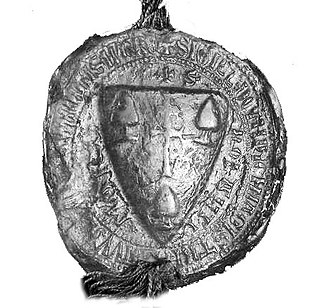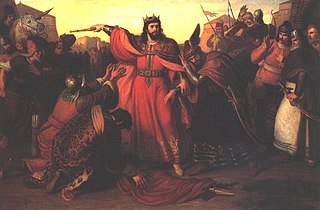Related Research Articles
Nicholas I was a Hungarian distinguished nobleman, who held several secular positions during the reign of Emeric, King of Hungary.
Julius (I) from the kindred Kán was a powerful Hungarian baron and landowner, who held several secular positions during the reign of kings Emeric, Ladislaus III and Andrew II. He was the ancestor of the gens Kán which originated from Baranya County.
Benedict, son of Korlát was a Hungarian nobleman, who served as voivode of Transylvania twice, from 1202 to 1206 and 1208 to 1209. He was styled as "dux" by royal charters – the first one who is not a relative of the royal Árpád dynasty –, which indicated his high social prestige. Due to the lack of sources and the presence of multiple barons named Benedict in the period simultaneously, there are a number of difficulties in drawing and defining his career path.
Ipoch from the kindred Bogátradvány was a Hungarian distinguished nobleman from the gens Bogátradvány, which, according to historian Simon of Kéza, was originate from Bohemia.
Ampud, also Ampod, Apod or Ompud was a powerful aristocrat in the Kingdom of Hungary in the second half of the 12th century. He was Ban of Slavonia between 1163 or 1164 and 1171 or 1174, and Palatine of Hungary from around 1164 till around 1176.
Denis was an influential lord in the Kingdom of Hungary in the second half of the 12th century. He was Palatine of Hungary in 1184, Ban of Slavonia between 1181 and 1184, Ban of Dalmatia in 1183, and ispán of at least three counties. He was a commander of the Hungarian army fighting against the Byzantine Empire in the reign of Stephen III of Hungary.
Theodore of the Csanád clan was an influential nobleman in the Kingdom of Hungary at the turn of the 12th and 13th centuries. He led a palace coup against Andrew II of Hungary and was installed as Palatine of Hungary for a brief time in 1222. He was also ispán of at least five counties in the first decades of the 13th century.
Bánk of the Bár-Kalán clan was an influential nobleman in the Kingdom of Hungary in the first decades of the 13th century. He was Palatine of Hungary between 1212 and 1213, Judge royal from 1221 till 1222, and Ban of Slavonia between 1208 and 1209 and in 1217. He was also ispán of at least eight counties in the first decades of the 13th century. According to later tradition, Queen Gertrude of Merania's brother raped Bánk's wife, which caused her assassination in 1213. He is the subject of the play Bánk bán by József Katona, and of the opera of the same name by Ferenc Erkel.
Mog, also Moch, Magh or Mok was a powerful Hungarian lord in the Kingdom of Hungary at the turn of the 12th and 13th centuries, who served as Palatine of Hungary three times.
Mika (I) from the kindred Ják was a Hungarian influential lord in the Kingdom of Hungary at the turn of the 12th and 13th centuries.
Nicholas was an influential Hungarian lord in the Kingdom of Hungary, who served as Palatine of Hungary twice during the reign of Andrew II of Hungary.

Martin from the kindred Hont-Pázmány was a Hungarian influential lord in the Kingdom of Hungary, who served as Judge royal in 1214, during the reign of Andrew II of Hungary.
Atyusz III from the kindred Atyusz was a Hungarian influential baron, the most outstanding member of his family, who served as Judge royal from 1215 to 1217, during the reign of Andrew II of Hungary.

Roland (I) from the kindred Rátót was a Hungarian influential lord, who held several important secular positions for decades. He was also the ancestor of the Paksi family.
Thomas (I) from the kindred Monoszló was a Hungarian noble, who served as Ban of Slavonia from 1228 to 1229.
Keled (I) from the kindred Hahót was a Hungarian noble, who served as Vice-ban of Slavonia and ispán of Zagreb County in 1234. He held both offices simultaneously, when the powerful baron Julius Kán served as King Andrew II's last Ban of Slavonia.
Csépán (I) from the kindred Győr was a Hungarian influential lord at the turn of the 12th and 13th centuries, who served as Palatine of Hungary from 1206 until his murder.
Pat (I) from the kindred Győr was a Hungarian influential lord at the turn of the 12th and 13th centuries, who served as Palatine of Hungary from 1209 until 1212.

The Brothers' Quarrel was a war of succession within the Árpád dynasty between Emeric, the King of Hungary, and his younger brother, Andrew, Duke of Slavonia. It lasted from 1197 to 1203, covering almost the entire reign of Emeric. The conflict had a significant impact on the development of the 13th-century society and political system in the Kingdom of Hungary.
Andrew was a Hungarian lord at the end of the 12th century, who – as a confidant of the rebellious Duke Andrew – served as Ban of Slavonia. Through his marriage, he was son-in-law of the late King Géza II of Hungary.
References
- 1 2 Markó 2006, p. 218.
- 1 2 Zsoldos 2011, p. 288.
- ↑ Zsoldos 2011, p. 173.
- 1 2 Zsoldos 2011, p. 42.
- ↑ Szabados 1999, p. 96.
- ↑ Zsoldos 2011, p. 230.
- ↑ Zsoldos 2011, p. 126.
- ↑ Zsoldos 2011, p. 17.
- ↑ Zsoldos 2011, p. 138.
- ↑ Szőcs 2014, p. 15.
- ↑ Herucová 2015, p. 120.
- ↑ Zsoldos 2022, p. 44.
- ↑ Herucová 2015, pp. 121–122, 124.